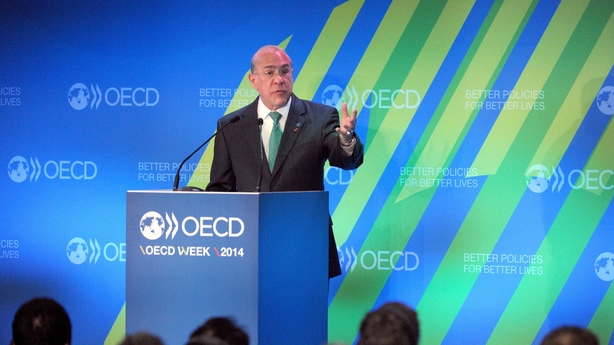The Organisation for Economic Co-operation and Development has said that a robust and broad based recovery is under way in Ireland.
In a review of the country's economy carried out every two years, the OECD said that unemployment is falling steadily, public debt has peaked and continues to fall, and international credibility has been strengthened.
The Paris-based organisation said the turnaround in economic fortunes is an opportunity to deal with the legacies of the economic crisis, including remaining unemployment and banking sector weaknesses.
However, it noted that property prices are rising, particularly in Dublin, and that there are growing pressures to narrow the tax base and increase public spending.
The OECD said the Government should broaden the tax base and protect revenues by shifting the burden of taxation away from work and onto immovable assets, such as property.
Ireland's property tax is low by international standards, and the OECD urged the Government to increase the amount of money raised from property tax in order to reduce income tax.
While, the organisation welcomed the introduction of water charges, it said they are still "among the lowest in the OECD".
It also said that "water stress" - the availability of water supply and wastewater disposal - is among the lowest in the OECD, but in some areas quality of supply is an issue due to under-investment.
It also cautioned that the expansion of the dairy sector poses new challenges, and said the development of environmental technologies in the agribusiness sector has been modest by OECD standards.
Today's report suggested a number of reforms the Government could make which the OECD believes would improve economic performance.
In particular, the OECD has suggested a slower withdrawal of housing assistance payments and Family Income Supplement as a way of overcoming welfare traps that discourage people from taking up paid work.
It also suggested government agencies need to focus more on helping to boost productivity in the economy, especially among small firms.
The OECD report said that Ireland faces three main challenges in economic policy:
- enhancing the country's economic resilience by moving towards a balanced budget position in structural terms to reduce the high public debt, and by strengthening the banking system
- making growth more inclusive by increasing labour market participation and reducing unemployment - particularly long term unemployment.
- improving long term growth prospects by making the Irish owned business sector more dynamic, productive and innovative, while keeping the country attractive to inward investment.
Although it notes that the economy is the fastest growing of the 31 OECD states, the report set out five key risk factors for Ireland:
- slower trend growth in the world economy, which could cause the economy here to stagnate, making unemployment, debt and non-performing loans harder to deal with.
- another property sector boom and bust, which could cause more banking problems.
- changes in the international corporate tax regime, at either EU or OECD level.
- contagion from renewed Euro area turmoil (most likely from Greece, although the report does not name any particular country).
- Brexit - the risk of Britain leaving the European Union.
On personal tax, the report said that a broadening of the tax base should be accompanied by a reduction in the high marginal tax rates on labour, which it described as a disincentive to work.
It suggested introducing a third lower rate of income tax, reducing the lower rate of USC and reducing large tax credits.

This would lower marginal rates at the bottom end and make work more attractive, without loss of overall revenue to the state.
In terms of corporate tax, the report said that Ireland has a "low and stable corporate tax rate" which remains important in attracting foreign direct investment.
It welcomed the move to abolish the so called "double Irish" tax arrangement by 2020, with the option already closed to new companies since the start of this year.
"Given the strong presence of intellectual property intensive IT and pharmaceutical companies in Ireland, preventing artificial profit shifting through the payment of non-market-priced royalties on intellectual property owned by companies in zero or low tax jurisdictions is crucial," the report stated.
It also said that Ireland should continue to keep its transfer pricing rules up to date with the OECD/G20 BEPS project.
The OECD noted that while tax changes elsewhere may have an important economy-wide impact in Ireland, the closing of tax loopholes in other countries could also increase the importance of the tax rate in determining investment locations.
It said that "as Ireland is relatively competitive in this domain, this may help it to attract greater foreign investment".
The report said the Government should consider setting up a single agency to focus on increasing productivity, particularly among Irish owned firms, "whose performance lags significantly behind the foreign owned sector".
On the legacies of the banking crisis, the OECD said the repossession of collateral on non-performing loans is "inefficient" and it called for a faster resolution through the courts system of non-performing loans that require repossession.
It also said the banks will continue to cross subsidise unprofitable tracker mortgages with Standard Variable rates that are far above the ECB policy rates. This, it warned, may impede new credit growth and household mobility.
It said there is a significant mismatch in the skills available in Ireland and the needs of employers, and urged a faster rollout of programmes to upskill the long term unemployed, and to enforce the obligations of the unemployed to take up offers of employment or training.
It also pointed to the very high cost of childcare in Ireland (the second highest in the OECD) as being a significant dis-incentive to take up work, and urged the Government to increase access and affordability of quality childcare, particularly for low income families.
Disadvantaged schools should also receive more resources, for attracting better teachers and providing tutoring to students.
The OECD also warned against over concentration of emigrant children into a small number of schools, saying 80% of emigrant children are in 23% of schools.
The organisation said that Ireland's system of work permits is above average in its processing time, but added that the Government could improve the flow of high skills workers to Irish firms by making it easier for foreign students to seek work here after they have competed their studies, citing Australia as an example.
It said health spending will be improved by fully rolling out the "money follows the patient " initiative began last year, and by publishing financial and operational performance data on individual hospitals.
While the use of block funding to hospitals is inefficient and lacks transparency, the OECD said the introduction of activity based financing of the hospital sector - the so-called 'money follows the patient' approach - should give better results, especially when combined with publishing performance data.

Actions to ensure sustainable recovery to continue - Noonan
Minister for Finance Michael Noonan said the survey rightly acknowledges the "significant progress" that Ireland has made since the last survey in 2013.
"The survey provides a prescient analysis of the challenges now faced by Ireland and of the policies to address these in areas such as fiscal sustainability, financial stability, inclusive growth, productivity and environmental sustainability," Mr Noonan said.
He said that Ireland has made significant progress since the last survey in, when the country was just on the verge of recovery to a situation where it is now the fastest-growing economy in Europe.
"Since then, we have continued to take the necessary actions to ensure a sustainable recovery," he added.

